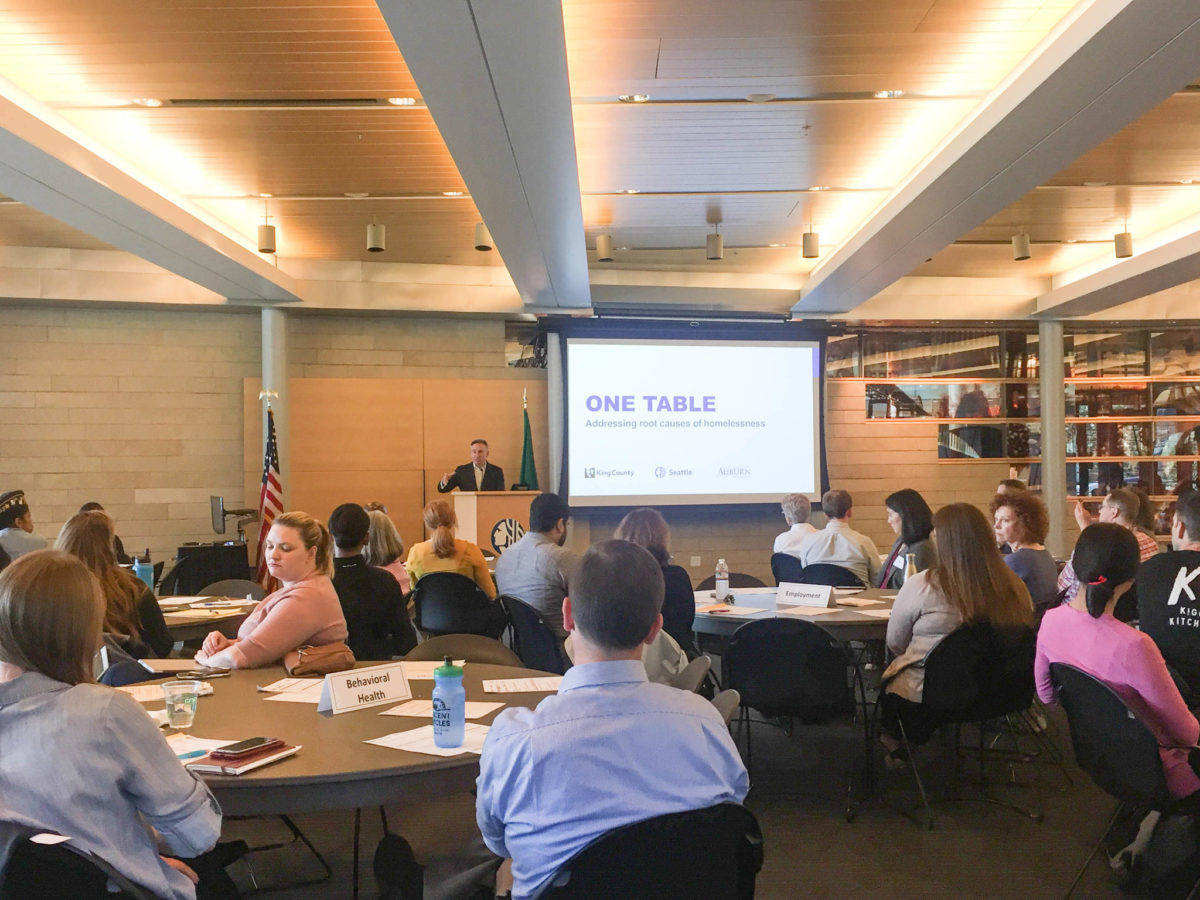Back in January, King County Executive Dow Constantine, Seattle Mayor Jenny Durkan and Auburn Mayor Nancy Backus convened the One Table task force with the goal of developing “community action steps to confront the root causes of homelessness under an ‘aggressive timeline.’ ”
A group of more than 70 business leaders, homeless service providers, nonprofit affordable housing developers, local elected officials and other stakeholders make up the task force. When the formation of the group was announced, Durkan said that it was designed to “create a regional, coordinated approach and holistic response to our homelessness crisis.”
However, a “regional, coordinated approach” has yet to materialize roughly eight months into One Table’s existence. While the task force has produced a very broad set of policy recommendations, local governments, nonprofits or the private sector have yet to pursue them.
“We have a set of recommendations to move forward,” Constantine said at an Aug. 3 task force meeting at Seattle City Hall. “Those recommendations represent our region’s collective commitment.”
After initial meetings in the spring, the group had only draft recommendations that identified broad “priority actions,” such as building 5,000 affordable homes over the next five years and employing 1,300 people at risk of becoming homeless. But the draft did not identify any ways to pay for the proposed investments. In response, some One Table members argued that the draft was underwhelming since it featured neither new revenue sources nor strategies appropriate for the scale of the regional homelessness crisis. The draft was allegedly informed by task force discussions, but ultimately created by county officials. County officials have estimated that the region needs around 90,000 additional units of housing affordable to those making less than 50 percent of area median income.
At the Aug. 3 meeting, Rachel Smith, Constantine’s chief of staff, said the county plans to hire consultants to develop a “regional action plan,” which would contain “specific plans, costs, and measurable outcomes for change.” She also said that the plan would serve as a “road map,” which local governments, businesses, and philanthropists could use to guide their own investments.
“The next stage is implementation, to get a plan, to make it real, for housing, for behavioral health, for employment, on the criminal justice system, for our foster care system, because we cannot be sitting in these rooms year after year and not take basic actions.” Durkan said at the meeting. “We have the moral obligation to act.”
Gordon McHenry, CEO of the anti-poverty nonprofit Solid Ground and a member of One Table, said many individuals on the task force had hoped that a clearly financed plan would be rolled out at the Aug. 3 meeting. “We don’t have a plan yet,” he said. “Implementing these strategies with a resourced plan is still a significant challenge … I think that’s where the hard work is.”
Mark Putnam, former director of All Home – the public entity charged with coordinating the regional homelessness response – and a One Table member, said that while the county’s move to hire a consultant to flesh out a detailed plan with cost estimates is a step in the right direction, the pace at which the imitative is moving isn’t quick enough.
Although the actual plan has yet to be developed, the meeting saw One Table’s co-chairs call upon task force members to declare which strategies from the “recommendations” they could commit to pursuing, as well as what they thought was needed from the rest of the task force.
“Each one of these people is going to be tasked with: ‘What are you going to do to bring us closer to these recommendations?’ ” Constantine spokesperson Alex Fryer told reporters during the meeting.
Asked how the One Table members were going to be held to their commitments, Fryer said they’re essentially relying on the goodwill of the group. “These folks are all committed to doing what they can about homelessness. These people want to help, they want to be directed,” he said. “If someone wants to drag their feet and say ‘I don’t want to do it,’ there’s no measure for us to discipline (them).”
McHenry said that he’s “cautiously optimistic” that the various members of One Table with resources (such as the business community) are committed to eventually investing in the strategies that will be laid out in the coming regional action plan.
County officials said that while One Table likely won’t meet regularly in the future as one big group, they will keep in touch with the members to collaborate on potential initiatives and keep them up to date on the development of the action plan.
At the start of the meeting, Backus, one of One Table’s co-chairs, said that while homelessness is a county-wide issue, each jurisdiction will handle it differently.
“The cities outside of Seattle have different needs. We all have issues, but we all have different needs. And we are probably going to be taking care of those in maybe similar, but somewhat discretely different ways,” she said, “because what works for Auburn isn’t going to work for Bellevue, isn’t going to work for Seattle, and we have to realize that.”
The City of Seattle and King County are restructuring All Home to give it more authority to leverage public resources and streamline the efforts of city and county agencies. The recommendations for reforming the organization aren’t slated to come in until December.
Despite the continued lack of a detailed regional action plan, several One Table members who spoke at the Aug. 3 meeting were clear about what they think is needed to address the crisis – increased financial resources.
As acting All Home Director Kira Zylstra told the room, “Ultimately, the need is housing and money.”


